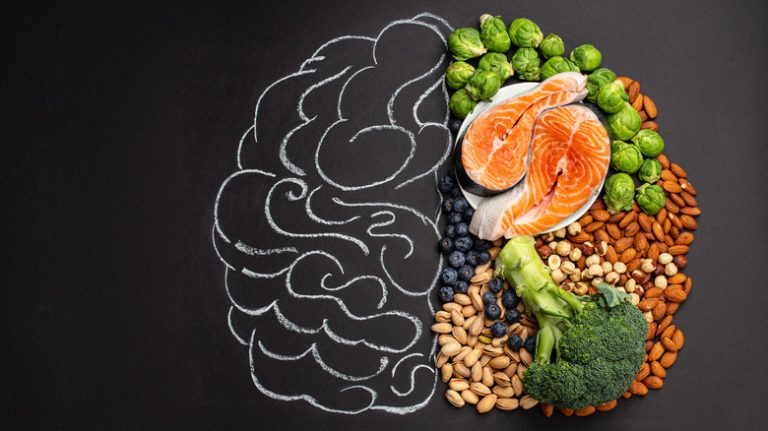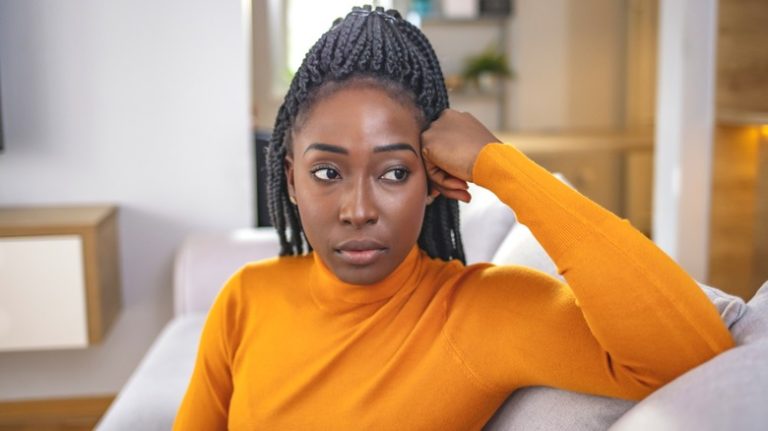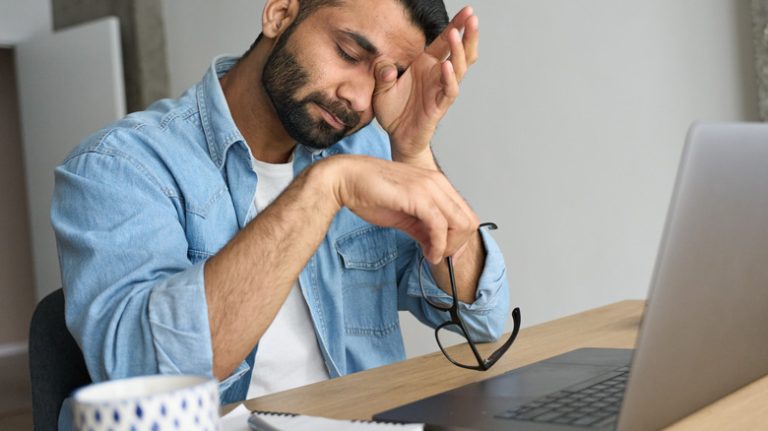If you’ve ever experienced anxiety, you know just how much it can impact the quality of your day. You certainly aren’t alone, as the National Alliance on Mental Illness (NAMI) reports that over 40 million American adults live with an anxiety disorder. Although occasional anxiety can be expected, excessive anxiety can affect your performance at work, school, or at home, while making everyday stressors even more challenging.
During an exclusive interview with Health Digest, Dr. Kristen Farrell Turner, Ph.D., a psychologist at Pritikin Longevity Center, dives into the science behind anxiety as well as natural ways to cope when it happens. Dr. Farrell Turner received her bachelor’s in psychology at Ohio Wesleyan University before completing her master’s in kinesiology with a concentration in exercise physiology at University of Michigan.
She begins by telling us that there’s an evolutionary purpose to anxiety, and that anxiety can be necessary in some cases. “At its core, anxiety (and, similarly, fear) typically involves activation of the sympathetic nervous system, a.k.a. ‘fight or flight,’ which prepares us to take action in the presence of a threat,” she shares. “It’s an evolutionary development that prepared humankind, both physiologically and cognitively – as best as possible – to outrun a literal threat; say, a tiger chasing us across the savannah.”
Dr. Farrell Turner explains that parts of the brain are evolutionarily wired for survival and that because of this, we sometimes still perceive many non-life-threatening situations as “life-or-death,” as if a tiger really were chasing us down the street.
What are some signs that your anxiety levels are too high?
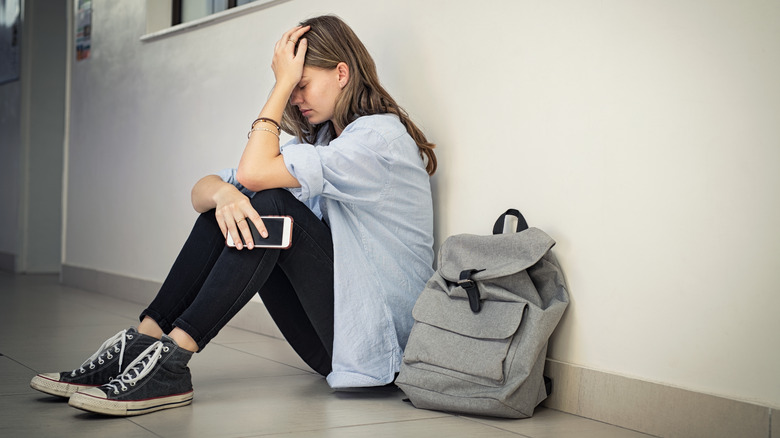
Though anxiety serves a vital purpose to us in life-threatening scenarios, it can still be overwhelming and uncomfortable to experience. Anxiety can impact the mind and body in a number of ways, Dr. Farrell Turner points out. “In addition to experiencing physiological changes, such as rapid heart beat and nausea, people often have somewhat distorted thoughts (e.g., catastrophic, all-or-nothing) when they are anxious,” she says.
She reveals that it’s natural to feel occasional anxiety and that some levels of anxiety can even be useful, as they provide a “red flag” that something is meaningful in our lives and is worth giving our attention to. “For example, mild anxiety about an upcoming exam can serve as a reminder that this event is ‘out there,’ and we can use that anxiety to our advantage by making sure we study for the exam,” she explains.
The effects of prolonged anxiety, however, can be detrimental to both our physical and mental health. “If you experience the following signs and symptoms more often than not for at least a couple of weeks, you may be experiencing more anxiety than is healthy: major changes in sleep and appetite, muscle tension, fatigue, difficulty concentrating, and frequent worrying and/or rumination,” Dr. Farrell Turner notes.
You may also be experiencing unhealthy levels of anxiety if your anxiety negatively affects your recreational, work, or family life.
What daily habits can contribute to increased anxiety?
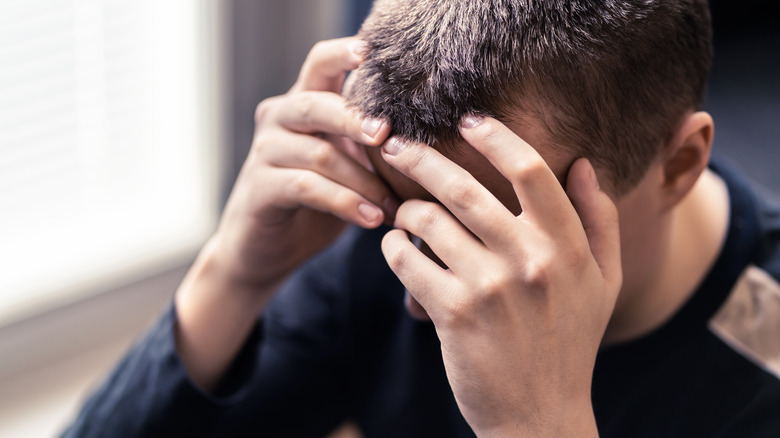
Despite our bodies’ “fight or flight” response being largely out of our control, we may be able to control some daily habits that influence our levels of anxiety. For instance, anxiety can be exacerbated by an absence of a routine that contains purposeful and fulfilling activities, according to Dr. Farrell Turner. “While it might seem relaxing to have no schedule — and, short term, on vacation, it can be — it actually tends to increase our anxiety,” she told us. “Having structure and routine, in addition to a life purpose and planned actions toward that purpose, can reduce anxiety.”
Additionally, she warns that having a perfectionist mentality can increase levels of anxiety. “Some people may cause more anxiety by not prioritizing their needs/desires and sometimes feeling that they need to ‘do everything’,” she said. According to Psychology Today, extreme perfectionist thinking is believed to be motivated by the desire to avoid judgment or failure and can contribute to anxiety and depression.
To minimize the harmful consequences of prolonged anxiety, Dr. Farrell Turner suggests making time for pleasurable activities on a daily basis, such as by exercising or taking part in other recreational activities. It’s also important to take breaks throughout the workday by making time for meals and snacks.
The difference between natural remedies for anxiety and medication
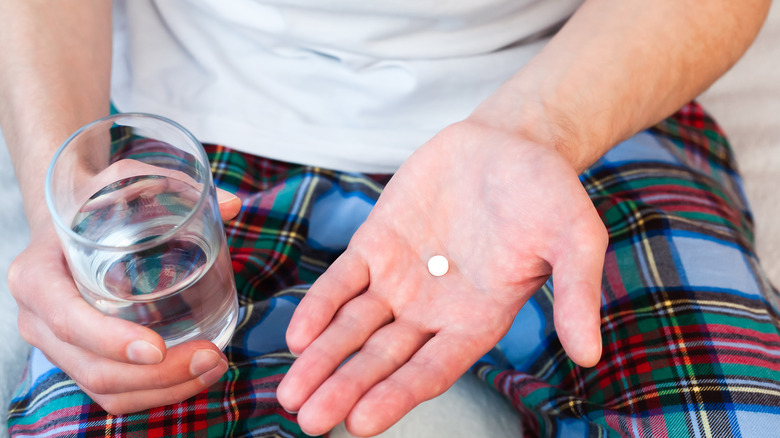
Yuliia Markova/Shutterstock
The medical field has long been exploring different treatments to alleviate the stressful feelings associated with prolonged anxiety and improve the quality of life of those who struggle with it. Dr. Farrell Turner tells us that one way anxiety can be treated is with antidepressant medications like SSRIs or SNRIs. Anxiolytics, such as Xanax, can also be prescribed to treat anxiety.
“Anxiolytics tend to reduce anxious feelings fairly quickly but temporarily, whereas antidepressants can take a few weeks to start working,” she explains, while noting that such medications can come with side effects. Therefore, she recommends discussing the pros and cons of medication with your primary care physician if you are interested in this particular treatment method.
For individuals who prefer more natural treatment options, there is also hope. The most tried-and-true non-medical anxiety treatment is psychotherapy in its many forms, says Dr. Farrell Turner. “Arguably the most common therapy approach for anxiety is cognitive behavioral therapy, which involves identifying and restructuring maladaptive thoughts, learning and applying healthy coping strategies, replacing unhealthy behaviors with healthier ones, and sometimes exposure therapy,” she shares. In a 2024 review and meta-analysis published in JAMA Psychiatry, cognitive behavioral therapy appeared to have a significant relationship with symptom reduction in participants with certain anxiety disorders, particularly generalized anxiety disorder, social anxiety disorder, and post-traumatic stress disorder.
To further ease anxiety, Dr. Farrell Turner recommends learning effective communication, time management, and organizational skills.
Natural strategies to combat anxiety
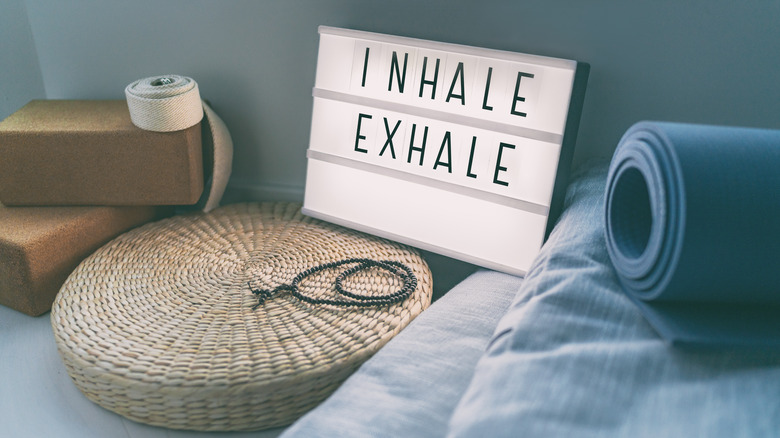
Maridav/Shutterstock
Alongside psychotherapy, there are other natural methods you can utilize to relieve anxiety and stress. “As mundane as it sounds, mood is very much affected by ‘the basics’ of our daily routines: quality sleep, nutritious food, physical activity, healthy relationships, enjoyable hobbies, and fulfilling work/purpose,” Dr. Farrell Turner told us. In addition, she emphasizes the importance of getting outside more often due to the body’s need for natural sunlight.
You may also feel more relaxed after a long and stressful day if you incorporate meditative practices into your daily routine. “Many people find relaxation exercises such as imagery and progressive muscle relaxation, as well as mindfulness meditation, to be very effective in combating anxiety,” she explains.
One component of the “fight or flight” bodily stress response that we do have control over is our breathing, and slowing our breathing can help to alleviate anxiety. Harvard Medical School reports that deep breathing can slow your heartbeat, stabilize your blood pressure, and reduce tension. To encourage relaxation, Dr. Farrell Turner recommends holding your breath for a few seconds between inhalation and exhalation, as well as taking longer on the exhale than on the inhale.
To find out more about Dr. Kristen Farrell Turner, you can visit the Pritikin Longevity Center website.

